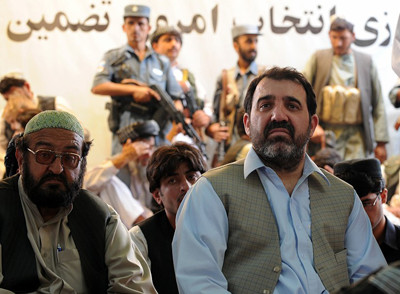By Trudy Rubin

Nothing symbolizes this problem more than his younger brother Ahmed Wali Karzai, head of the provincial council in the crucial province of Kandahar, the Taliban birthplace where insurgents are retaking control. Western officials believe Ahmed Wali Karzai is neck-deep in the drug trade and responsible for handpicking provincial officials who will ensure that opium is trafficked without hindrance. He is also believed responsible for the widespread vote-rigging in Kandahar.
Sometime this week, we may learn who the president of Afghanistan is. Or we may not.
Imagine: As President Barack Obama wrestles with whether to send more troops to fight the Afghan Taliban, it's still unclear whether the sitting president, Hamid Karzai, won the majority required to avoid a runoff.
A five-man Election Complaints Commission charged with reviewing claims of massive ballot fraud has finished its work, but we're still waiting for its announcement. If the commission waits past this week, it may be too late to hold a second round before severe winter weather sets in.
So the Karzai factor haunts Obama. Some Obama officials say Karzai's lack of legitimacy dooms any deeper involvement in Afghanistan.
A U.S. counterinsurgency strategy is meant to create the space to strengthen the Afghan government and security forces. But if the Kabul government is so corrupt, how can we counter the Taliban? We are beginning to hear pundits invoke the removal of the corrupt Saigon leader Ngo Dinh Diem by the Kennedy administration in 1963.
May I suggest that everyone take a deep breath and recognize that Karzai is here to stay? In a runoff between the top two vote-getters, Karzai would garner the majority — whether the balloting is clean or not. Even if the situation is defused by setting up a national unity government — in which Karzai's main challenger agrees to participate — Karzai would still be the president.
Moreover, a repeat of the Diem scenario would be nuts, not to mention counterproductive. As in South Vietnam, there are no candidates available who could survive politically and do a better job. So the administration needs to figure out how to deal with the Afghan government we have, not the one we might want.
A weak Afghan central government is not necessarily fatal to a counterinsurgency. U.S. officials once thought Iraqi Prime Minister Nouri al-Maliki was hapless and hopeless. After the "surge" strategy improved security in and around Baghdad, Maliki found his nerve.
The problem with Karzai, however, is a tolerance for corruption that has undercut the chance for regional progress. Nothing symbolizes this problem more than his younger brother Ahmed Wali Karzai, head of the provincial council in the crucial province of Kandahar, the Taliban birthplace where insurgents are retaking control.
Western officials believe Ahmed Wali Karzai is neck-deep in the drug trade and responsible for handpicking provincial officials who will ensure that opium is trafficked without hindrance. He is also believed responsible for the widespread vote-rigging in Kandahar.
Obama officials have tried to confront Hamid Karzai. Then-Sen. Joe Biden famously threw his napkin on the table and walked out of a dinner in February 2008 after Karzai denied charges of corruption. Obama's special envoy to Afghanistan, Richard Holbrooke, has reportedly shouted at Karzai, to no avail.
The crisis created by the Afghan elections offers a new opportunity to confront Karzai, perhaps with different tactics. Clearly the Afghan leader understands he has an image problem in the United States; he appeared on ABC's "Good Morning America" this week to endorse more U.S. troops and deny election fraud.
So why not send Secretary of State Hillary Clinton — who has not burned her bridges with Karzai — to talk privately with the Afghan leader, without shouting or publicizing the details?
Clinton could tell Karzai that U.S. public support for fighting the Taliban and building Afghanistan is fading quickly. She could stress that Americans won't tolerate an increase in U.S. casualties or aid if they see no results.
And she could politely but firmly say it's time for Ahmed Wali Karzai to depart for a much-deserved retirement to Britain or Dubai, and for the appointment of officials in Kandahar who aren't beholden to the drug mafia. Otherwise, it will be impossible for NATO leaders to send more troops to Kandahar.
If Karzai balks, Clinton might pull out a photo of the late Afghan president Mohammad Najibullah, whom the Taliban hanged from a lamppost in 1996 after they took Kabul. "We do not ever want such a thing to happen to you," she could say firmly, "nor do we intend to pull troops out. But if you can't help us, our public may leave us no choice."
Perhaps such a stark choice at this opportune moment will jolt Karzai's thinking. It certainly is worth a try.



